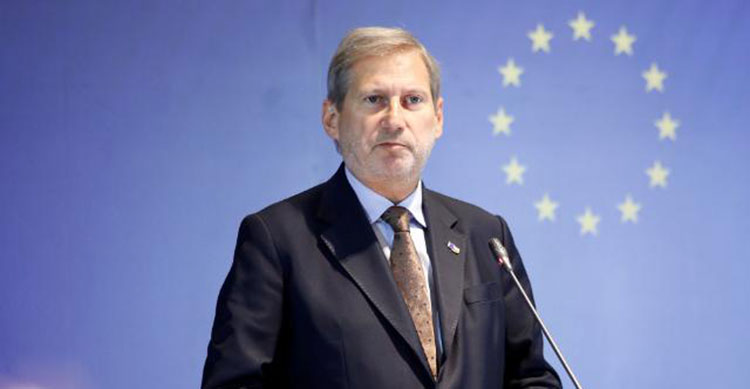In an interview he gave to Pink TV during his visit to Belgrade, European Commissioner for Neighbourhood Policy and Enlargement Negotiations Johannes Hahn said that European Commission President Jean-Claude Juncker stressed that all Western Balkans countries had a clear, concrete European perspective. Asked to comment on Juncker’s Letter of Intent in which he stated that there would be no further enlargement until 2025, Hahn said that “the pace of accession is decided by Serbia. It is not a firm date; the accession could take place before or after that date. The progress of a country on the European path decides the pace of accession“.
Hahn said that the process of European integration requires “strong commitment, not only from Government leaders, but also from the Parliament, civil society and even media,“ noting that it is important to make citizens aware of the benefits of EU membership.
“Citizens perceive the Union as some kind of a block that never ceases to impose new requirements. [The EU] is not about pleasing European officials, it is about improving living conditions, increasing the well-being of citizens and opening new opportunities for employment. This process increases investors’ trust in the legal system of a country which is why Serbia has witnessed an investment boom from the outset of accession negotiations, and not only by European companies.“
Speaking about the EU-Serbia negotiation process, Hahn said that he was “fully convinced that we will open two or three chapters by the year’s end.“
He also lauded the achievements of the Government. “Economic indicators show that the country anticipates further growth, the unemployment is dropping, the number of foreign investors keeps growing, etc. I would say this is another positive result of the Serbia-EU negotiations, but also a result of Government’s strong commitment to implement necessary economic reform and promote the private sector in particular,“ Hahn said.
He assessed President Vucic’s initiative to open an internal dialogue on Kosovo as a bold move. “Opening an internal debate is crucial for Serbia’s European future. He [Vucic] has chosen the path of statesmanship and leadership. I believe this is a necessary step. I can only support the initiative, but it is up to Serbian citizens to take decisions, to discuss the topic and, finally, to find a solution.“
Asked whether he expected Prime Minister Ramush Haradinaj and the new Kosovo Government to continue the Belgrade-Pristina dialogue, including the establishment of the Community of Serb Municipalities and other issues dealt with by the Brussels agreement, he said that “institutions and competent authorities in both countries have a duty to keep the dialogue going, regardless of the government convocation. If the European perspective is at stake, everyone must contribute to the dialogue. And not only to contribute to it, but to stick to the agreement and implement it.“
When it comes to future of the EU and the challenges it is facing, such as the migrant crisis or Brexit, Hahn said that the living standard in the EU was still “high, not to say the highest in the world. We strive to establish the democracy by upholding the law and freedom of expression. Migration will be the biggest challenge for the human kind of the 21st century. In this context, Europe is certainly a target. There was no doubt that the biggest economy in the world would be hit by the global economic crisis. But we have proven that we can grapple with those challenges. To put it simply, Europe is the solution to all those challenges,“ said Hahn in an interview with Pink TV and quoted Jean-Claude Juncker: “The wind is back in Europe’s sails.“




